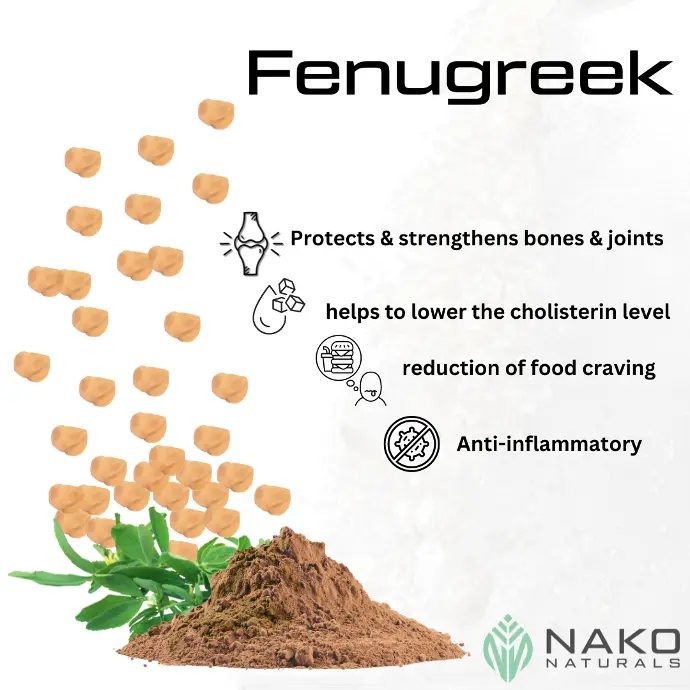Product catalogue
Did you know?
NAKO NATURALS collaborates directly with farmers to implement advanced practices that enhance sustainability and cleanliness in cultivation, production, and distribution processes.
Fenugreek Extract 60% Saponins 35:1
| Botanical Name: | Trigonella foenum-graecum L |
|---|---|
| Appearance: | fine powder |
| Plant Part Used: | seeds |
| Raw Material Used: | cultivated |
| Extraction Solvent: | Ethanol/Water |
| Extract Ratio: | 35:1 |
| Active Ingredient | Assay in % |
|---|---|
| Saponins | 60.0 |
| If the specification does not meet your requirement, please contact us for a tailor made one. |
Historical Background & Origin
Greek fenugreek (Trigonella foenum-graecum) is a member of the Fabaceae family, native to the eastern Mediterranean region, particularly prevalent in Greece (Latin: foenum-graecum = Greek hay). Cultivated in various countries such as the Near and Middle East, North Africa, France, Greece, and California, fenugreek seeds are primarily utilized as a spice. The medicinal preparations derived from fenugreek seeds are predominantly sourced from Morocco, Turkey, and China, where pods resembling goat horns produce curved legumes up to ten centimeters long. The German term "Bockshornklee" alludes to the pod shape. Each fruit contains ten to 20 furrowed, yellow or reddish-brown fenugreek seeds (Foenugraeci semen), highly esteemed both as a spice (commonly found in curry blends) and as an herbal remedy.
Medicinal Plant
Regarding its healing properties, initial scientific studies corroborate the millennia-old experiences. Similar to many traditional herbal remedies, modern methods gradually unveil the active ingredients and confirm their efficacy.
When first introduced to the broad spectrum of fenugreek's effects, skepticism may arise. Nevertheless, millennia-old experiences validate its efficacy, documented independently in ancient texts across various cultures.
FENUGREEK
Internally, Greek fenugreek (Trigonella foenum-graecum) can be employed for temporary appetite loss and to aid in the management of diabetes mellitus and mildly elevated cholesterol levels.
Externally, fenugreek proves beneficial in treating mild skin inflammations, boils (folliculitis), ulcers, and eczema.
Both internal and external applications are medically acknowledged.
Health Benefits
- Anti-inflammatory
- Bone-strengthening properties
- Cholesterol-lowering effects


